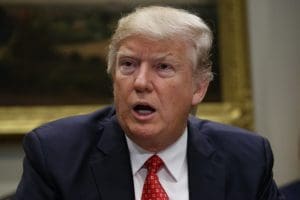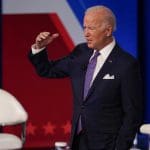Appeals Court exposes bigoted, unconstitutional intent of Trump's Muslim ban
Donald Trump’s words and intent regarding Muslims have always been clear. Despite his last minute protestations to the contrary, it is obvious that Trump intentionally acted to discriminate against individuals on the basis of religion when he signed the executive order banning Syrian refugees from entering the country and restricting immigration from a number of Muslim […]

Despite his last minute protestations to the contrary, it is obvious that Trump intentionally acted to discriminate against individuals on the basis of religion when he signed the executive order banning Syrian refugees from entering the country and restricting immigration from a number of Muslim majority countries (excepting ones in which he has significant business interests).
The countries subject to the ban have not been responsible for a single fatal act of terrorism against the U.S. in over 20 years; Saudi Arabia, the country most represented among the perpetrators of the 9/11 attacks on the World Trade Center and the Pentagon, is exempt from the ban, along with Afghanistan and Pakistan; and Trump seems to be uninterested in combating domestic terrorism, which has had the largest impact on the safety of Americans.
Trump may be continuing his penchant for “alternative facts” by now asserting that this long history of calling for and intending to implement a ban on Muslims is not really a ban on Muslims. But the Ninth Circuit Court of Appeals seemed skeptical of this argument during a hearing on the travel ban. The judges asked pointed questions about Trump’s anti-Muslim statements as well as the reasons for selecting countries with little evidence of a connection to terrorism in a ban purportedly intended to combat terrorism.
And contrary to Trump’s revisionist history, he does indeed offer a wealth of evidence to bolster the judges’ queries.
During the primaries, he issued a “Statement on Preventing Muslim Immigration,” followed by a call for a “total and complete ban” against Muslims entering the United States — which then-Governor and Vice President-elect Mike Pence called “unconstitutional.”
Months later, when asked by Chuck Todd on NBC’s Meet the Press whether Trump’s more general descriptions of an immigration ban were a “rollback” of his prior strong statement against Muslim immigration, Trump not only denied that it was a rollback, but stated that he intended for his comments to be interpreted as an expansion of his calls for a Muslim ban.
And immediately following the election, Trump’s staff restored the Muslim ban onto Trump’s campaign website, after a temporary removal.
Thus, when Trump signed that order, he was clearly fulfilling a consistent campaign promise to ban Muslims from the United States, which, as Shareblue reported, has been a failure on constitutional and moral grounds.
Regardless of how the Court of Appeals finally rules on this matter, it is clear that Trump is being taken to task for his reckless anti-Muslim rhetoric and intentions.
Recommended

Trump leaves door open to banning medication abortion nationwide
Donald Trump is planning to release more details in the weeks ahead about how his administration would regulate access to medication abortion, according to comments he made during a lengthy interview with Time magazine published Tuesday.
By Jennifer Shutt, States Newsroom - April 30, 2024
Biden on abortion rights: President expects to give speech Tuesday on new Florida 6-week ban
‘Having the president of the United States speaking out loud and with confidence about abortion access is a great thing’
By Mitch Perry, Florida Phoenix - April 22, 2024
Biden calls for expanded child tax credit, taxes on wealthy in $7.2 trillion budget plan
President Joe Biden released his budget request for the upcoming fiscal year Monday, calling on Congress to stick to the spending agreement brokered last year and to revamp tax laws so that the “wealthy pay their fair share.”
By Jennifer Shutt, States Newsroom - March 11, 2024







































































